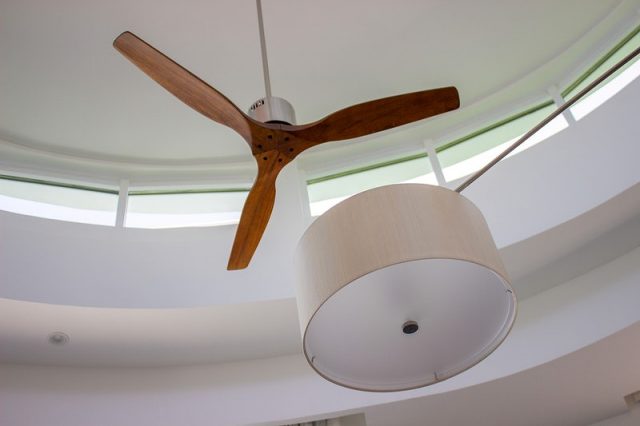Last Updated on November 12, 2022 by
Ceiling fans can become a valuable addition to your house, providing additional relaxation during the warmer months and improved heating airflow during the wintertime. Ceiling fans are a terrific way to enhance the efficiency of your HVAC system. When something goes wrong with a ceiling fan, it might start making unpleasant, downright annoying sounds.
These sounds can keep you awake at night, and in certain situations, they can even damage your ceiling and put your family in danger. Different types of ceiling fan problems will vary depending on the sounds, so it’s crucial to figure out what’s causing your unpleasant ceiling fan noises so you can fix them properly.
The Dimmer
If you hear a buzzing noise coming from your ceiling fan, you’re dealing with the most prevalent sort of unpleasant ceiling fan noise. A droning sound may not have been audible during the day, but if you use your ceiling fan when attempting to sleep each night, it can be highly noticeable and irritating.
When dimmer settings are used to alter fan speed, among the most prevalent reasons for a buzzing ceiling fan is. Ceiling fans were never meant to be utilized with dimmer switches. You will hear a buzzing noise because this is not the right approach to set fan speed. Standard speed controllers should be used instead of darker.
Remote control
Bad antennas are another issue if you have a fan with remote control. A poor receiver would not get a strong enough signal from the remote, resulting in a buzzing noise. The problem can be solved by removing the receiver. Alternatively, you can attach the fan directly to the power supply. If the buzzing ceases, you’ve found the cause of the problem.
Capacitors
If unplugging the receiver somehow doesn’t resolve the buzzing issue, faulty capacitors may be the source of the problem. You’ll need to try replacing the switch things up and capacitors to fix these problems. When this happens, your fan is likely to experience lower voltage problems. The motor may struggle if the voltage is too low. Fan noises can be caused by voltage levels below 105 volts A/C. If there are numerous fans on a single circuit, this can sometimes be the source of the noise. This is common in older homes with multiple rooms on the same course.
Read More: A Comprehensive Guide About What Is The Average GPU Temp While Gaming?
Screws that are too loose
Loose screws may be causing your ceiling fan to rattle. You can tighten the screws that link the ceiling rotor blades towards the motor if they are open. Ceiling fan blades with loose screws might be dangerous to your family. When a ceiling fan blade becomes loose, it can damage your property or hurt family members. At the same time, you’re at it because there are no loosened screws inside the motor casing. All bolts should be snug but not overly so. Inside the switch casing, wire interconnections can also make a rattling sound.
You can ensure that all wire interconnections are secure and not producing the rattling by rolling against each other and against and inside the switch housing with the primary source turned off.
Elevate
When ceiling fans are put directly into the joists, they can make a lot of noise. Normal fan noises will be magnified through the post if a fan is mounted on a ceiling joist, resulting in a louder noise. Certified hangers will be used to reduce the amount of noise. A ceiling fan hanger that has been approved will be installed between the ceiling joists. This will assist in isolating the fan and preventing noise from being magnified. The engine noises will not quickly get to the post, causing the magnified sounds.
When to call an electrician for repair
While you can usually troubleshoot most ceiling fan noises, you should know when to call for an electrician’s help.
The drive capacitor may be defective if you hear a sizzling noise and smell a strange odor. If this is the case, you should replace it immediately by calling an electrician.
Turn off the fan immediately if you notice sparks or strange noises coming from the motor. Leaving ceiling fans on can increase your risk of an electrical fire.
What is the best time to seek qualified help for your fan noise?
You most likely have a bad drive capacitance if you hear a sizzling sound and a weird odor originating from your ceiling fan. If that was the case, you should get it replaced right away. If you see any sparks or weird noises emanating from the fan motor, you should turn it off instantly until fixes can be made. A fire hazard may arise if the engine is straining and is left on. Because most ceiling fan wiring is situated in the ceiling, sparks might ignite a fire in the shelters that will go undiscovered for several minutes, raising the chances for you or your household.
Dirty, irregular, or misaligned blades
The blades must first be inspected. Dust and filth on rotor blades can knock them off balance, explaining why your ceiling fan is shaking. Check that the edges are not deformed, broken, or hanging unevenly when you clean them, as this is another typical cause of ceiling fan noise. The light connected to the fan has been knocked loose/the equipment has been knocked loose. If the fan has a light fitting, the equipment has likely been pushed open while you’ve been changing the bulb. Check for any loose bulbs and sconces that may obscure the bulbs.







